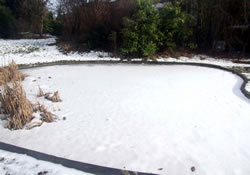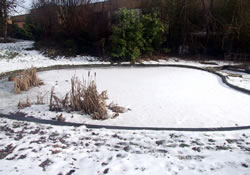
Winter is often a season where weather keeps us indoors, nature seems to slow down and trees go dormant through the cold months of the season making us think that dealing with the fishpond can be relaxed until the warmer weather arrives in the spring. This is not the case when owning and caring for a fishpond, your fish will move to the deepest part of the pond giving you a false sense that they will not require any care until they become more active and life bounces back as the seasonal temperatures begin to rise. Many fishpond keepers do not realise that caring for the fishpond over winter is not just about caring for your fish but caring for your pond as well and any plants added to the fishpond also need the same care that is applied throughout the other seasons in the year.
As the water temperatures drop the feeding regime slows down and the fish go into a state of semi-hibernation giving a false impression that maintenance work can be held off until the water temperatures rise and the fish become more active. If care is not taken of the fishpond then fatalities will occur with your fish as gases can become trapped in the fishpond which will become toxic to the fish but several simple steps will avoid this and your fish will survive through to the next year with minimal problems and no undue stress to the fishpond keeper.
Pond plants are often ignored and left to do their own thing through the winter but if the pond plants are not fully hardy then they may dieback which will result in the foliage rotting away soiling the water quality of the fishpond which in turn will affect the health of the fish inside the pond. Even hardy plants may show signs of die-back and any leaves that are not looking healthy should be removed before they rot which will lower the water quality.
Pond plants that are not hardy or even semi-hardy should be removed when temperatures drop below freezing as they will not survive these conditions, always check when purchasing plants whether they are capable of dealing with lower temperatures. They can be removed in their aquatic baskets and wrapped to protect the roots, keep the aquatic soi; and they will survive happily until the weather conditions improve and they can be set out in the fishpond again. Make sure they are stored in a frost-free place and check them on a regular basis to make sure that are overwintering in a good condition. You should only need to moisten the compost 2-3 times through the winter but never allow it to dry out completely before re-watering.
Debris can still enter your fishpond, even though autumn is over there may still be tree leaves and other debris around that can easily be blown into your fish pond so remove these with a net before they start to rot, netting over the fishpond should prevent excessive leaves entering the water.
During winter your fish should have stored enough fat to keep them healthy and survive the extreme conditions, if you have continued feeding the fish until they swim down to the lower levels make sure that any uneaten food is removed as this will also decay spoiling the water quality. The fish will let you know when they no longer require feeds so always check that you are not adding too much food to the fishpond. Not only is excessive food harmful to the fish but it is wasting your money as well if it is left uneaten.

As fishpond keepers know, ice is public enemy no.1- if the fish pond is allowed to freeze over completely it becomes a chamber for toxic gases, in the warmer months this is not a problem as the gases are released into the atmosphere but when ice completely covers the fishpond the gases have nowhere to go and are trapped in the water column which will become dangerous for the fish in there. To prevent the fishpond from freezing over you can purchase commercial fish pond de-icers that produce a low heat by means of a heating element housed inside them, these will not prevent ice from forming but they will leave the area clear where they are positioned allowing the toxic gases to escape. The same result can be achieved with smaller fish ponds by floating polystyrene of light balls as the wind moves these objects around the fish pond it prevents the water surface from freezing over. If you do not possess a de-icer and are too late to add floating objects then you can clear areas of the ice with warm water but this is only a short term solution as the cleared area will quickly freeze over again during long cold spells.
Many fish pond keepers turn off the filters and pumps during the winter months, this could be an ideal time to check them out and clean filter media if it is clogged, check the pipework from the water pump to the filter to make sure there are no blockages from accumulated debris. Running the filtration system during severe cold spells can damage the equipment, check which temperature range your system is appropriate for and if the temperature drops below this range, turn off immediately before any damage occurs.It is also wise to raise the water pump to a higher level during winter, warmer water occupies the deeper depths, if your pump is sat at the bottom of the fish pond all the pump will do is drag colder water to the bottom dropping the temperature of the fish pond.
As you can see during the winter you still need to spend time with the fish pond making sure that all is well, don’t be fooled into thinking that during the winter months the fish pond will tick over with no problems, this is not the case!
Hopefully this article has been helpful to you and helps to keep your fish pond at it’s best all year round!
About the Author
Jan Hvizdak owns https://fishponds.biz which offers tips on keeping pond fish and growing pond plants.

